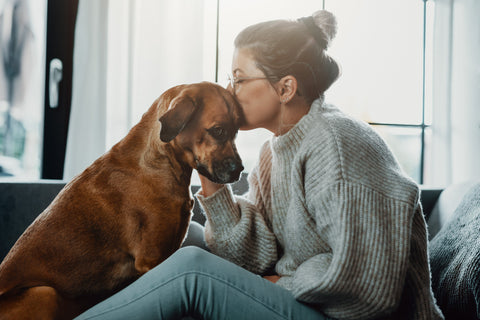

Signs of Depression in Dogs
Chad Dodd, a vet with over 20 years of experience in the animal health industry and part of the YuMOVE team, gives his expert advice on how to spot signs of depression in dogs and, more importantly, how you can help to get them back to their bouncy, happy and healthy selves.
Causes of depression in dogs
Whilst animals do not have the same emotional understanding as humans, it doesn't mean they cannot experience feelings of sadness, fear and depression. Dogs can also display signs of feeling anxious too! Though the signs may be similar to those of a dog with depression, there are a couple of differences to consider.
Dr Chad Dodd says: ‘Anxiety often manifests as response to triggers or stimuli, like loud noises (fireworks, thunderstorms) or being left alone or kennelled. Depression is generally brought on by a significant life change, loss of a family member or another pet, moving to a new home, or even other medical problems.’
Here are some factors which may be having an affect on your dog's physical and mental well-being:
Change in environment
Some people don’t like change, and some dogs don’t either. A change in environment such as moving house, a renovation project, an addition to the family, or even a drastic weather change can have an effect on a usually happy dog. Change can be unsettling and may take some time to adjust to.
Fear
If your dog has a phobia or a fear of something, they may show signs of upset and this could be causing them to feel depressed. Dogs can’t simply tell us what’s wrong and they may show fear in different ways to what you may expect.
Grief
Mourning the loss of someone is not just a human trait- dogs may mourn the loss of a companion too! If a human or animal companion has recently moved, gone on holiday or passed away, and your dog’s behaviour has noticeably changed, then your dog may be going through a mourning period. Losing a playmate can often result in canine depression.
Illness
When your dog displays signs of depression, it is important to rule out any physical causes or illnesses as soon as possible. If you notice any abnormal behaviour, contact your vet/seek professional medical help right away. If your vet does identify a health problem, follow the treatment recommendations. Hopefully, once your dog recovers from any illnesses, their behaviour will return to normal.
Their owner

Dogs are emotional beings and can pick up on the energy around them. If their owner or close companion is sick, upset, stressed or angry, then a dog may begin to empathise and feel similar emotions. Similarly, if their owner is on holiday or is away from the home for a longer period than usual, then a canine may show signs of separation anxiety or depression.
Here are the biggest signs of depression in dogs, according to vets
A sudden change in your dog’s behaviour or mood is often a clear sign that something is wrong. Whilst a change in behaviour could be due to a number of reasons, there are specific traits you can look out for in order to determine whether your dog may be depressed. Some signs of depression in dogs may include some or all of the following:
Loss of appetite/increased appetite
When a person becomes depressed, their relationship with food may change. They may be so overcome with emotion or lethargy that they lose their appetite. Some people may have the opposite experience and may eat more often as a way of comforting themselves. Dogs can also experience changes to their appetite depending on their mood. Keep an eye out for any sudden or extreme changes to their eating habits.
Being lethargic and sleeping often
If your dog starts sleeping a lot more than unusual or seems to lack energy and becomes lethargic, then this could be a sign of depression. Adult dogs may sleep up to 14 hours on average, in a 24-hour day, with puppies needing even more sleep than that! So it could be quite difficult to distinguish a sleepy dog from a run-down, depressed dog. However, if you know your canine, you should be able to spot any extreme or sudden changes in their sleeping pattern.

Excessive paw-licking
There are a number of reasons as to why your dog may lick their paws from time to time. Licking or chomping on the paws could be the result of a physiological reason such as an infection, eczema and dry skin, or joint issues, so it’s definitely worth checking with your local vet. However, if your dog is licking their paws and exhibiting other signs on this list, then it could be linked to depression.
Hiding or becoming withdrawn
Sometimes when you are down, you just don’t feel like being social and participating as you would normally. This is also a sign of depression in dogs, as they can react in the same way when something is wrong. If your dog seems to be withdrawn and prefers to be alone, more than usual, then this could be a sign that something is wrong.
Whilst these are all common signs of depression or anxiety in dogs, Dr Chad Dodd says: ‘It's important to note that every dog exhibits anxiety and depression differently. Sometimes the same trigger causes one dog to be timid while others develop aggression. It really just depends on the dog and the situation at hand.’
Vet reveals what you can do to help
If your four-legged friend is displaying one or more of these behaviours and you have ruled out any possible illness or injury, then it’s time to think about their emotional and mental well-being. Dog depression is very real and is unpleasant for the poor pup and their families. The good news is that there are ways you can help. If you think that your dog may be showing signs of depression, here are five things you can do to lift their mood and get things back on track...
1. Stick to a routine
If your dog is displaying signs of depression, then it is only natural that you will want to comfort them and give them lots of cuddles and attention. This is great as it lets your dog know that they are loved and supported. However, one of the best ways to get things back on track is to stick to your dog's normal routine - especially if you think that the change in behaviour is due to change in environment.
2. Regular walkies
Almost all dogs love walks and, just like humans, regular exercise is a great way to keep them physically fit and healthy. Who doesn’t feel better after blowing off some steam? And with lock-down measures relaxed, you have no excuse! By taking your dog on regular walks (or extra walks!) they will get to enjoy one of their favourite activities whilst cherishing some alone time with you.
3. Entertain them
Walkies are very popular amongst doggies, however there are plenty of other ways to keep your dog entertained. Playing games, teaching them tricks and investing in fun toys, are all great ways to keep your pet occupied and feeling playful.
4. Keep them social
Dogs are pack animals and love having company, so playing with their humans or socialising with other dogs should help to lift their mood. When you are at home, try to have some alone time with your dog or include them in activities. You could look at signing your dog up to a doggy daycare class or look for a dog sitter/walker to keep them entertained and interactive throughout the day when you go back to work - if safe to do so.
5. Try YuMOVE Calming Care
YuMOVE Calming Care for Dogs is one of our premium supplements, designed to support natural calming pathways in the brain. A simple but effective way to help reduce anxiety or stress and support dogs to become more happy and playful.
You may also consider seeking the help of an animal behaviourist if you are still unsure. Remember, your dog's best interests are of the utmost importance and what may work for one canine, may not work for another.




